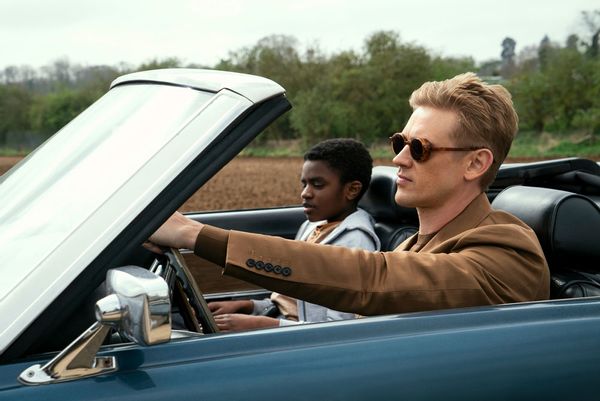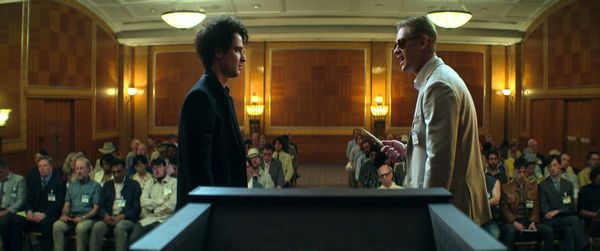
In Netflix's adaptation of Neil Gaiman's graphic novel "The Sandman," dreams are not just good or bad, but truthful, deceptive, or hopeful . They can reveal things about our innermost desires, inspire our imaginations, and drive our actions in the waking world, but can also be weaponized as powerful tools of manipulation — and sometimes they are, and do, all these things at once.
Rather than a metaphor for blindness, the Corinthian's toothy eyes indicate that, like Donald Trump, he is only capable of seeing that which can benefit him ... that he can use or literally consume.
One such dream, the American Dream, is a powerful source of hope for many people because it draws on the timeless archetype of the hero rising from nothing to become everything they'd ever hoped to be. The flipside of this dream, however, is a nightmare: the resentment, hatred, and violence of those who feel they've failed to live up to it or have been cheated out of it. Demagogues like the series' Corinthian and Donald Trump gain, maintain, and expand their power by inciting this resentment to ever greater and more dangerous heights, and by directing it toward already-marginalized communities. Convincing those who have long held power in our society that they are the true victims not only legitimizes our violent history as one long act of self-defense but licenses whatever violence may be necessary in the future to maintain this brutal status quo.
The main villain of "The Sandman" is the Corinthian (Boyd Holbrook). An incarnation of a Nightmare that's escaped from the dream realm, he is the manifestation of the most base and corrosive human desires. The form he takes is strikingly American — slick, sadistic, and self-absorbed, the American id personified.
We first meet the Corinthian in Episode 1, as Morpheus (Tom Sturridge), the lord of dreams and protagonist of "The Sandman," attempts to return his creation to the dream realm before being captured himself and imprisoned for over 100 years. The Corinthian wonders why, when they are so powerful, Dreams should refrain from running amok in the waking world.
"There is nothing preventing us from taking whoever, whatever we want," he says, immediately evoking Donald Trump's "You can do anything" ethos.
By the end of the episode, we see who the Corinthian is in more detail, and what taking what he wants really means. Standing over a young man's corpse, its eyes removed, we see that the Corinthian is also missing his eyes — in their place, however, are mouths full of teeth. Speaking to his deceased victim, he says, "I'm not gonna stop until I've reshaped this world to look just like me."

Rather than a metaphor for blindness, the Corinthian's toothy eyes indicate that, like Donald Trump, he is only capable of seeing that which can benefit him — things, or people, that he can use or literally consume. To get these things, however, neither sticks to overt coercion alone — being as charming to those they need as they are ruthless to those who cross them.
Over the course of the season, the Corinthian aids several characters, including freeing a child, Jed (Eddie Karanja), from his abusive foster parents and reuniting him with his sister Rose (Kyo Ra). But as with Trump, who is known not just for spitefully turning on those he feels have betrayed him, but also for fawning over those he thinks he could gain something from, there is always an ulterior motive. Charisma, flattery, deceit, and force are different means for the Corinthian and Trump to pursue the same pathologically egotistical and, in many ways, very-American dream: to remake other people, systems, and even entire worlds in their image, no matter the cost.
As has begun during Morpheus' more than 100-year absence, dreams can also be weakened ... The American Dream was always an exaggeration — for certain groups, the most marginalized to this day, it was never attainable.
Another villain in "The Sandman" is John Dee (David Thewlis). Whereas the Corinthian uses charm, deception and brutality to further his goal of domination, Dee wants to use the power of dreams to remake the world into an entirely truthful one. Toward this end, he manipulates a diner full of people into revealing their darkest secrets and eventually killing each other and themselves. Over a gruesome montage in which the diner's patrons cut, burn, chop and stab themselves, Dee intones, "The truth is a cleansing fire, which burns away the lies we've told each other and the lies we've told ourselves."
When Morpheus finally confronts him, he argues that the dreams that Dee's victims had weren't lies . . . but aspirations — features of their personalities that were just as true as any failures to live up to them. Hope, the Sandman argues in an earlier episode, is the most powerful force in the universe, paradoxically continuing to exist even in hopeless situations. But, as has begun to happen during Morpheus' more than 100-year absence, dreams can also be weakened if they are not defended and maintained, their foundations cracking and crumbling into dust. The American Dream was always an exaggeration — for certain groups, the most marginalized to this day, it was never attainable — but even for many who could hope to achieve it in the past, the cracks have grown cavernous.

By Episode 7, we are introduced to the result of the crumbling dream realm paired with the Corinthian's unchecked mayhem: the "Collectors." The Collectors are a group of serial killers, motivated by the exploits of the Corinthian, who are planning their annual gathering, the cheekily named Cereal Convention. Unable to locate a suitable headliner for their convention, they settle on the desperate idea of copying the Corinthian's horrific style of murder.
"If we want to get his attention," one of the chairs of the planning committee rationalizes, "we have to think like him. Act . . . like him."
The Corinthian finds the Collectors and, pleased with the idea of "a gathering of like-minded souls . . . sharing the same dream," agrees to speak. It's "a dream that the Corinthian inspired," one of the flock replies.
At the convention, the Corinthian delivers the keynote speech, telling the Collectors that they are "very special people," almost exactly what Trump called the Jan. 6 insurrectionists, and that together they are the "American dreamers driving down the holy road of true knowledge that's paved with blood and gold." He wants them to know that – even though they're ostensibly killing for neither power nor profit and may be invisible to most people, or misunderstood and maligned – he sees their true greatness and he wants them to see themselves that way, too. Looking out over a sea of faces, eyes closed and absorbing his every word, he says, "We are gladiators. Conquerors. We are explorers . . . truth seekers. We are swashbucklers. We are hunters. Soldiers of fortune. And kings of the night."
Cult leaders and their followers serve as mirrors for one another — each side needing the other to know how special it is because it reflects their own specialness back. For followers, the leaders show how great someone like them can become if they conform to the leader's example, while leaders can extrapolate from their leadership of such a special group that they are the most special. Like a hall of mirrors, though, this twisted feedback loop of validation distorts the perspective of everyone who participates in it.
First, if everyone in the cult is special, then why have many of their dreams failed to materialize? Why are they not successful, happy, and envied in addition to merely being "special"? The deprivation that they feel — a feeling constantly being reinforced — must have a cause that's proportional, in scale and malevolence, to their extraordinary specialness.
Second, if everyone in the cult is so special, then everyone who is opposed to its goals, or merely not a part of it, is not just mediocre but also part of the sinister force that's stealing the dream from those who truly deserve it. The reason followers of demagogues haven't achieved their dreams isn't because of unjust structural factors, which make even relatively simple dreams unreachable for many, nor because most of them are not that special — reasons far too mundane for them to consider — but because they are being viciously attacked and oppressed by the very groups that they themselves have long attacked and oppressed.

There should be no shame in having one's dreams dashed in an economic system that makes even modest hopes for a better life unobtainable so that a handful can live out their wildest fantasies. Unyielding optimism in the face of daunting odds is often an asset, but it can also obscure our deeper problems – papering over the cracks as they are forming, until they have become too large to fix without a major overhaul. Anger is an appropriate response to the slew of crises that we're facing as a country and as a species – many of which average people have had little say over. But directing this anger at those who have suffered from these problems the most, rather than into collective action aimed at resolving the underlying issues, is not only counterproductive but morally repugnant. Harnessing this anger for their own aggrandizement at the expense of others, however, is something that the Corinthian and Donald Trump, and all those who aspire to be like them, specialize in.
When Morpheus unmakes the Corinthian, he denounces the aggrieved entitlement of the Collectors telling them, "Until now, you have sustained fantasies in which you are the victims, comforting daydreams in which you are always right." Then, relieving them of their delusions, he condemns them: "You shall know, from this moment on, exactly how craven, and selfish, and monstrous you are." The collective fever dream of victimhood and violent retribution conjured by Trump and his followers, however, will not be dispelled so easily.
"The Sandman" is currently streaming on Netflix.







